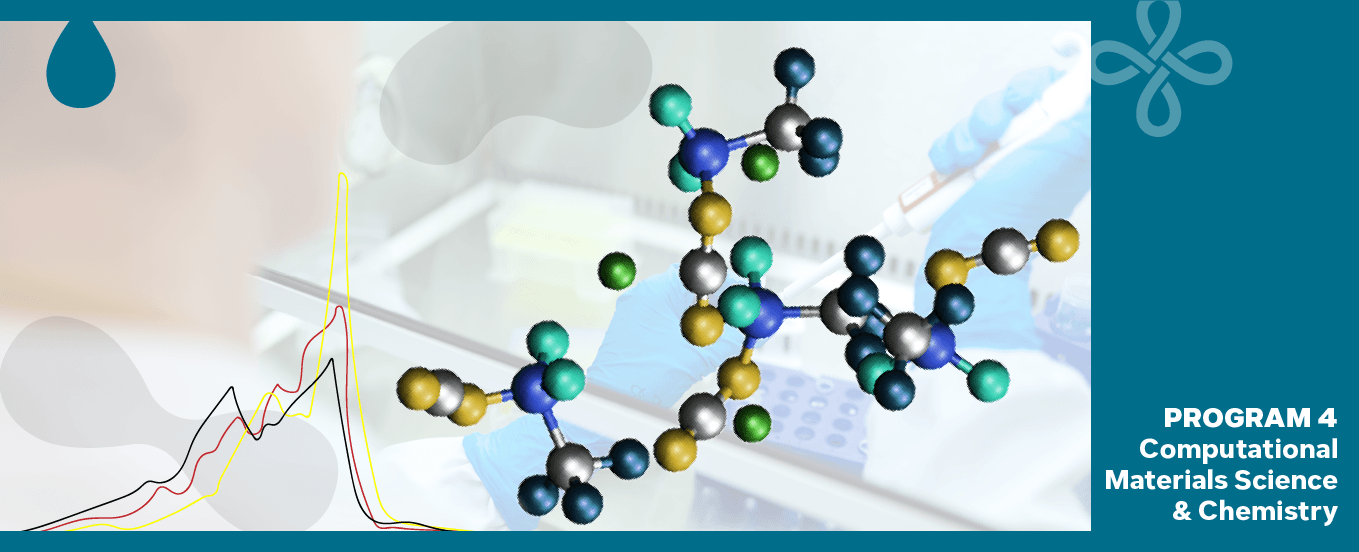Computational Materials Science and Chemistry

Principal Investigator (PI)
Juarez Lopes Ferreira da Silva – USP – São Carlos Institute of Chemistry – juarez_dasilva@iqsc.usp.br
Co-PIs
Ataualpa Albert Carmo Braga – USP – Institute of Chemistry – ataualpa@iq.usp.br
Ronaldo Cristiano Prati – UFABC – ronaldo.prati@ufabc.edu.br
________
Publications
See publications list.
________
The CMSC division combines the expertise of young researchers located in the most prestigious institutions of São Paulo state to deliver cutting-edge solutions for for the field of new energies. The division is focuses mainly on four research lines, namely, (a) methane conversion to new products, (b) CO2 capture and reduction to new products, (c) photons to electrons based on photovoltaics materials and (d) energy storage based on batteries and supercapacitors. Our expertise spreads from ab initio quantum-chemistry, to density-functional methods, ab initio and classical molecular dynamics, coarse-graining simulations, standard Monte Carlo for thermodynamic properties, basin-hopping Monte Carlo for global optimization of finite-size particles, parallel tempering Monte Carlo to explore phase-transition at finite size particles, kinetic Monte Carlo to simulate large-time scale phenomenons such transition-metal electrochemical deposition on solid surfaces and batteries flows and, finally, computational fluid dynamics to address the dynamics of ionic fluids.
_______
Projects
Co-PI: Ataualpa Albert Carmo Braga – USP – Institute of Chemistry – ataualpa@iq.usp.br
The main objective of this project is the use of atomic computational techniques in the study and development of new catalysts based on the combination of porous materials and nanomaterials for the conversion of methane to methanol or other materials of commercial interest, for example carbon nanostructures. It is hoped that at the end of this project we will have sufficient in-depth knowledge of the reaction mechanisms involving porous systems, such as typical or modified ionites, and nanoparticles, which will allow us to suggest new materials for the effective catalytic conversion of methane.
PI: Juarez Lopes Ferreira da Silva – USP – – São Carlos Institute of Chemistry – juarez_dasilva@iqsc.usp.br
This project focus on computational modeling of the fundamental processes involved in the capture of CO2 from the atmosphere and its conversion into products. Therefore, its team will investigate the capture and storage of CO2 in MOFs (metal- organic frameworks or Portuguese-based networks); and the separation of gases into MOFs; characterize small size effects on MOFs and how this affects CO2 capture; identifying structural features in MOFs that increase CO2 capture capacity and capacity; design efficient, inexpensive and non-toxic catalysts for CO2 reduction; to determine reaction mechanisms for the reduction of CO2 involving catalysts based on transition metal complexes; designing and predicting properties of nanocatalysts based on nanoligas and nano-oxides of transition metals, nanofragments of lamellar chalcogenides and other nano-sutured materials; to investigate the conversion of CO2 into methanol using nanocatalysts.
Co-PI: Juarez Lopes Ferreira da Silva – USP – São Carlos Institute of Chemistry – juarez_dasilva@iqsc.usp.br
This project aims to contribute to the generation of knowledge in new materials that can be used for the development of solar cells for the conversion of photons (electromagnetic radiation) into electrons (electric current) using the following classes of materials: chalcogenides, perovskites and organic materials. Therefore, we use the state of the art in atomistic computational methods (classical force fields, density functional theory and advanced techniques based on wavea functions.) In addition to these techniques, we will use machine learning algorithms in the exploration of new materials whenever required.
PI: Juarez Lopes Ferreira da Silva – USP – São Carlos Institute of Chemistry – juarez_dasilva@iqsc.usp.br
In this project we propose the application of computational techniques in the development and study of batteries, ultracapacitors and energy collectors in order to better understand, rationalize and predict physical-chemical and electrochemical mechanisms involved in such devices. Concepts, methodologies and approaches – linking the ab initi techniques to the modeling of materials in the microscale – will be applied to describe the performance of the components of the devices to be analyzed. The project will be developed along three independent lines.
Co-PI: Ronaldo Cristiano Prati – UFABC – ronaldo.prati@ufabc.edu.br
The overall objective of this project is the development and application of machine learning algorithms and intelligent data analysis in large datasets of material properties, in property prediction tasks and discovery of knowledge that enable the screening of new materials on a large scale. For this, it is intended to apply these algorithms in public data repositories, as well as datasets collected from calculations of chemical-quantum properties performed by several members of the division.










